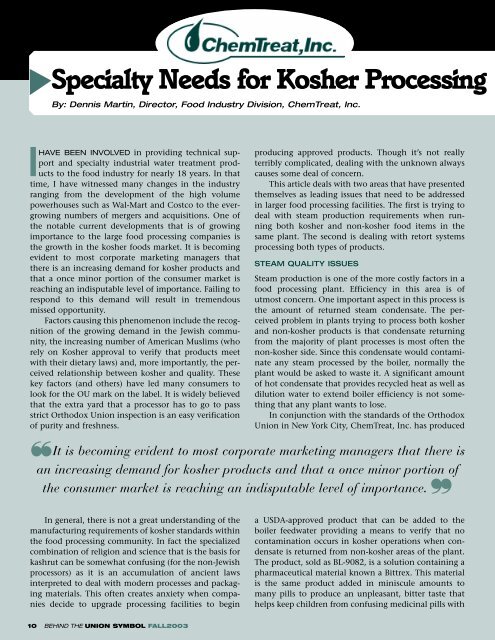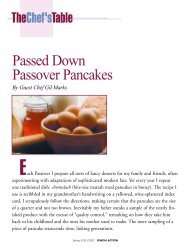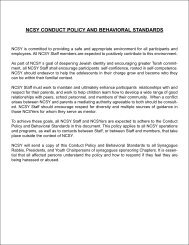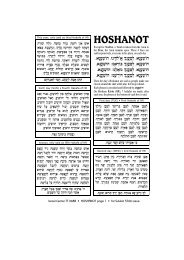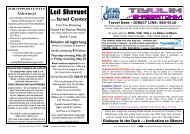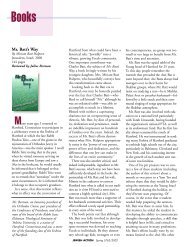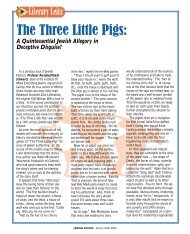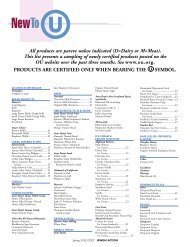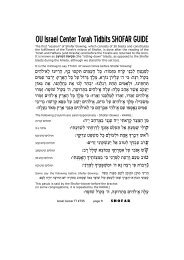EATING THEIR WHEATIES: - OU Kosher
EATING THEIR WHEATIES: - OU Kosher
EATING THEIR WHEATIES: - OU Kosher
You also want an ePaper? Increase the reach of your titles
YUMPU automatically turns print PDFs into web optimized ePapers that Google loves.
Specialty Needs for <strong>Kosher</strong> Processing<br />
By: Dennis Martin, Director, Food Industry Division, ChemTreat, Inc.<br />
IHAVE BEEN INVOLVED in providing technical support<br />
and specialty industrial water treatment products<br />
to the food industry for nearly 18 years. In that<br />
time, I have witnessed many changes in the industry<br />
ranging from the development of the high volume<br />
powerhouses such as Wal-Mart and Costco to the evergrowing<br />
numbers of mergers and acquisitions. One of<br />
the notable current developments that is of growing<br />
importance to the large food processing companies is<br />
the growth in the kosher foods market. It is becoming<br />
evident to most corporate marketing managers that<br />
there is an increasing demand for kosher products and<br />
that a once minor portion of the consumer market is<br />
reaching an indisputable level of importance. Failing to<br />
respond to this demand will result in tremendous<br />
missed opportunity.<br />
Factors causing this phenomenon include the recognition<br />
of the growing demand in the Jewish community,<br />
the increasing number of American Muslims (who<br />
rely on <strong>Kosher</strong> approval to verify that products meet<br />
with their dietary laws) and, more importantly, the perceived<br />
relationship between kosher and quality. These<br />
key factors (and others) have led many consumers to<br />
look for the <strong>OU</strong> mark on the label. It is widely believed<br />
that the extra yard that a processor has to go to pass<br />
strict Orthodox Union inspection is an easy verification<br />
of purity and freshness.<br />
producing approved products. Though it’s not really<br />
terribly complicated, dealing with the unknown always<br />
causes some deal of concern.<br />
This article deals with two areas that have presented<br />
themselves as leading issues that need to be addressed<br />
in larger food processing facilities. The first is trying to<br />
deal with steam production requirements when running<br />
both kosher and non-kosher food items in the<br />
same plant. The second is dealing with retort systems<br />
processing both types of products.<br />
STEAM QUALITY ISSUES<br />
Steam production is one of the more costly factors in a<br />
food processing plant. Efficiency in this area is of<br />
utmost concern. One important aspect in this process is<br />
the amount of returned steam condensate. The perceived<br />
problem in plants trying to process both kosher<br />
and non-kosher products is that condensate returning<br />
from the majority of plant processes is most often the<br />
non-kosher side. Since this condensate would contaminate<br />
any steam processed by the boiler, normally the<br />
plant would be asked to waste it. A significant amount<br />
of hot condensate that provides recycled heat as well as<br />
dilution water to extend boiler efficiency is not something<br />
that any plant wants to lose.<br />
In conjunction with the standards of the Orthodox<br />
Union in New York City, ChemTreat, Inc. has produced<br />
❝<br />
It is becoming evident to most corporate marketing managers that there is<br />
an increasing demand for kosher products and that a once minor portion of<br />
the consumer market is reaching an indisputable level of importance. ❞<br />
In general, there is not a great understanding of the<br />
manufacturing requirements of kosher standards within<br />
the food processing community. In fact the specialized<br />
combination of religion and science that is the basis for<br />
kashrut can be somewhat confusing (for the non-Jewish<br />
processors) as it is an accumulation of ancient laws<br />
interpreted to deal with modern processes and packaging<br />
materials. This often creates anxiety when companies<br />
decide to upgrade processing facilities to begin<br />
a USDA-approved product that can be added to the<br />
boiler feedwater providing a means to verify that no<br />
contamination occurs in kosher operations when condensate<br />
is returned from non-kosher areas of the plant.<br />
The product, sold as BL-9082, is a solution containing a<br />
pharmaceutical material known a Bittrex. This material<br />
is the same product added in miniscule amounts to<br />
many pills to produce an unpleasant, bitter taste that<br />
helps keep children from confusing medicinal pills with<br />
10 BEHIND THE UNION SYMBOL FALL2003


